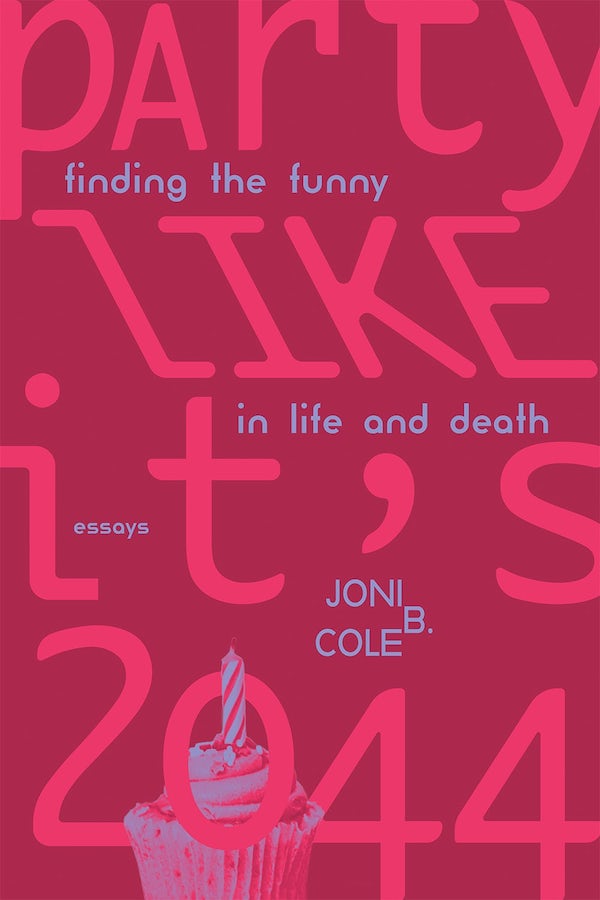
Today’s post is by author Joni B. Cole, author of Party Like It’s 2044: Finding the Funny in Life and Death.
When I was in elementary school, I can remember being told by more than a few kids, “You think you’re funny but you’re snot.”
Well now, all these years later, the laugh is on those poopyheads because, apparently, I am funny. Or at least the folks at the Erma Bombeck Writing Workshop think so because they’ve honored me with the distinction of “Humor Writer of the Month,” in conjunction with the release of my new essay collection Party Like It’s 2044: Finding the Funny in Life and Death.
But am I a humor writer?
I never thought of myself that way, at least not until after reading the reviews of my first essay collection published over a decade ago. The majority of the essays in that collection dealt with difficult life experiences: my father’s infirmity due to a stroke; friendships cleaved over politics; the ache of separation as my growing daughters started to assert their independence. (What’s so funny about your middle-schooler threatening mortification if you chaperone her class field trip? Had she seen some of the other mothers?)
Because I had to relive painful personal experiences while writing those essays, I was taken by surprise at the tenor of the reviews of that book: “riotously funny…” “honest and hilarious…” “Roll-on-the-floor funny…”.
But of course, being funny can happen even when you don’t exactly feel like laughing. Humor doesn’t discriminate and can sneak into all sorts of situations. I think about the time a woman who had taken several of my writing workshops died rather suddenly. She was my age, meaning she was way too young to be struck down; plus I hadn’t even been aware that she was ill. I felt terrible for her family but (it’s embarrassing to admit this) I’d never liked this woman. For years I’d tried to unsubscribe from her monthly newsletter that I hadn’t even subscribed to in the first place. Then this woman died and her newsletters still kept showing up in my inbox, which I had to admit was kind of funny.
In life, I suspect we’ve all been reminded that humor and gravitas are not mutually exclusive. As a writer, however, I rarely paid attention to this reality. In retrospect, I find it rather funny (funny peculiar, not funny ha ha) that I overlooked humor as a narrative device, particularly because I am what one reviewer of my new essay collection calls, “a writer’s writer.” She went on to refer to me (facetiously, I hope) as “that A+ student you always hate.” (An A+ student! Take that Professor Chesney! Now maybe you’ll rethink that low pass you gave me in your creative writing class.)
In all seriousness, being called a “writer’s writer” is a label I truly appreciate because I take it to mean my work shows how much care I put into the structure, the scene selection, the pacing, the verb choices, the metaphors within my stories. Typically, my creative process is to revisit and revise everything about a googol times. Yet I had never thought to look specifically at the humor in my work, at least not until after my first book fell into this category.
To learn more about the craft of humor writing, I googled “how to write humor,” and the first thing I learned is that words with the letter k are funny—advice that can be traced back to the days of vaudeville. After that, however, I stopped googling the topic. I’m not sure why; maybe because I worried that studying the craft of humor writing might take the fun out of my funny. I know this is ridiculous reasoning, just like I know that writers who refuse to get feedback because they think it might compromise their work are missing out on one of the best resources we have to write more and write better.
Even though I stopped researching how to write humor, I did start paying a lot more attention to this feature of my work. What made something funny? How did the humor enhance the story? Where did I get in my own way? I think this attentiveness has served my essays in myriad ways. For starters, it has helped sharpen my prose. It also has presented me with unique opportunities to deepen characterization, bring into greater relief the poignancy of a scenic moment, and elevate the work overall.
Way back when my first collection was put into the humor genre, it sometimes felt like a mixed blessing. Many times I’d find myself thinking, I’m riotously funny! While at the same time thinking, How the hell did I manage that? Becoming conscious of something you’ve been doing autonomically can do a number on you, like when you start thinking about breathing and then you can’t breathe normally.
Maybe for this reason, I still hesitate to call myself a humor writer. On a related note, when an interviewer references my new book as a collection of “literary humor essays,” I make sure they know which of those two descriptors I prefer. That said, I love the idea of making readers laugh.
While I don’t see myself as an authority on this genre, I have picked up a few tips by tuning in to my own process, and by reading (reading as a writer, that is) notable humor writers who have authored books that make me laugh out loud…and notable humor writers who have authored books that leave me cold. And therein lies an important lesson I have learned in writing and in life—that humor is subjective. You may think you’re funny, while others think you’re snot. (But who cares what those poopyheads think!)
8 tips on writing humor
1. Humor…humanity. There’s a reason those words share the same root. You know what’s funnier than a banana peel, or a joke, or puns, or even words with the letter k? People. Ordinary people, including yourself. Even in the most difficult situations, people are funny, if you take the time to pay attention to what makes all of us all too human.
2. Listen in. Paying attention to what you or the people around you are doing and saying is one way to tap into the funny. But paying attention to the thoughts that run through your head—a treasure trove of weird and wonderful material—is often an even richer resource for humor, and a meaningful way to get to know how your mind works.
3. Show, don’t mock. Making fun of people is not funny. Punching down is not funny. But showing characters on the page through their actions, details, dialogue, and internal monologue, now that can lead to successful humor. Why? Because it allows readers to form their own judgments about the character. Instead of trying to force the humor, it lets us decide for ourselves whether we should laugh at (or with) the people on the page.
4. Collect little humor gems. Like this text I just received from Xfinity, my telecommunications provider that has been trying for several hours to get me back online. Good news—your Xfinity service was restored at approximately 1:43 p.m. I’ll have to use that in some future essay—approximately 1:43 p.m.
5. There’s nothing funny about a blank page (or a first, or second draft…) At least in my case. In fact, my early drafts are usually pretty dry and uninspired, but that’s okay because I know how to find the funny, almost always in the process of revision and line editing.
6. Avoid too much self-deprecation. Yes, being up front about your quirks and weaknesses makes for powerful true stories. But overdoing the crazy for comic effect, at least in a personal narrative, can quickly read false and feel tiresome.
7. Less is more. If you’re trying to make every scene or line a laugh riot, you’re trying too hard. I fell into this bad habit for a time, maybe because I felt the pressure to continue to be “roll-on-the-floor funny.” Eventually, I curbed that futile and counter-productive impulse and now I’m not funny. Unless it’s in service to the story.
8. Back to k words. The days of vaudeville may be long gone, but this truth persists. Some sounds really are funnier than others, and the same goes for certain words, depending on the context. I’ll never forget when I was struggling with a certain detail in an essay and swapped out the name “Citibank” for “Deutsche Bank.” So much funnier! (At least I think so.)
Joni B. Cole is the author of seven books, including the new release Party Like It’s 2044: Finding the Funny in Life and Death; Good Naked: How to Write More, Write Better, and Be Happier; and Toxic Feedback: Helping Writers Survive and Thrive. For twenty-five years, she has taught creative writing to adults through her own Writer’s Center, as well as at academic programs and conferences around the country. She also runs the Good Naked Weekend Write-Away in White River Junction, Vermont. Find her at: www.jonibcole.com or www.thewriterscenterwrj.com


This is a great piece. I really appreciate the 8 suggestions. And I like knowing Joni’s early drafts are dry and uninspired. Mine are, too.
Loved this Joni. Keep being funny.
Great piece! Love the advice and some of the word choices.
Great insights, Joni. Although I write thrillers and don’t try to be funny, often the irony of human foibles just comes out on the page.
#3 – Show, don’t mock is an excellent guideline. We don’t want to laugh AT our characters (at least most of the time!), we want to laugh WITH them.
Thanks for your articulate review of humor.
Fun, funny, useful post on a topic that’s hard to write about and pin down. Thanks, Joni–I’m sharing in my newsletter.
You have it right there… “Instead of trying to force the humor, it lets us decide for ourselves whether we should laugh.” Funny doesn’t work if you’re trying. Recognising the humour in life is more effective than trying to invent it.
Thanks for the tips! I can relate to the concept that writing humor (or randomness) can be harder once you try to do it on purpose or understand it. Your point of not forcing it and letting the reader decide is great advice!